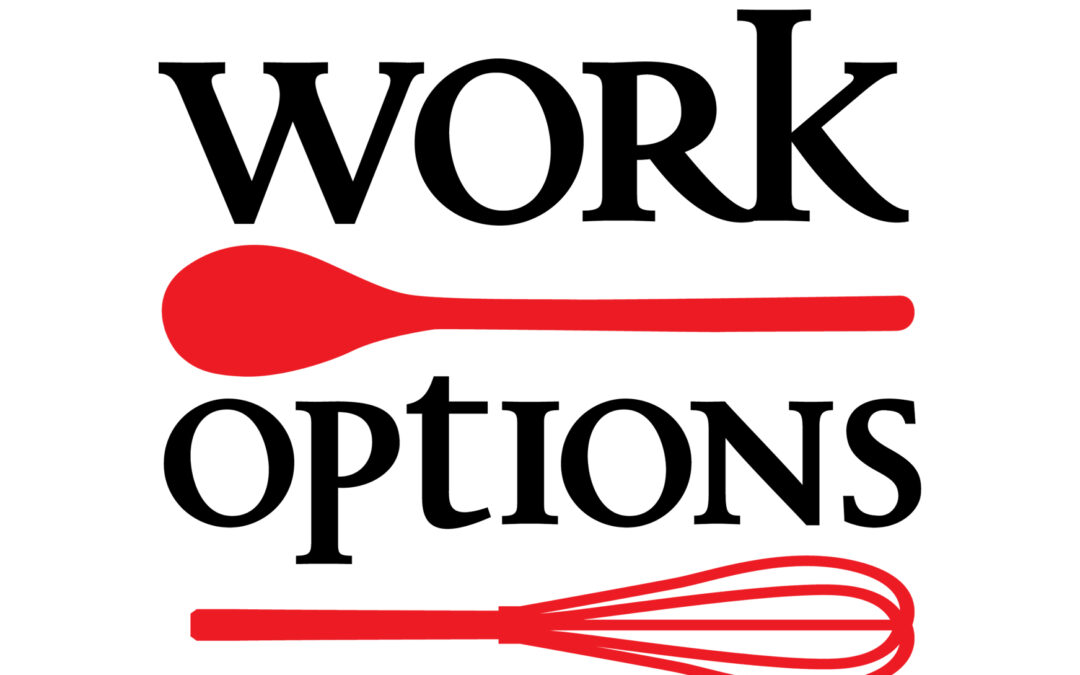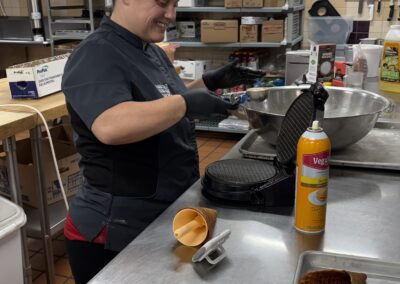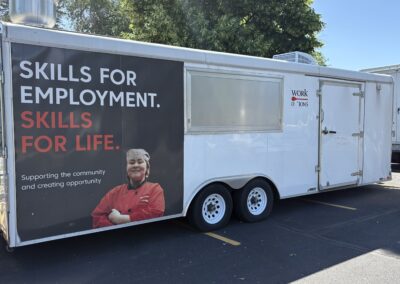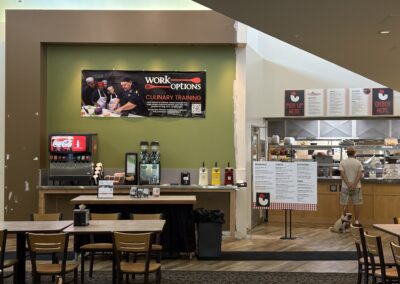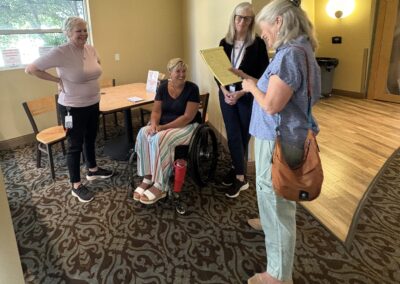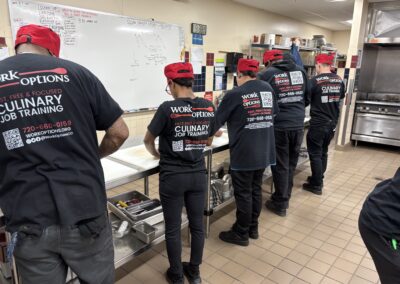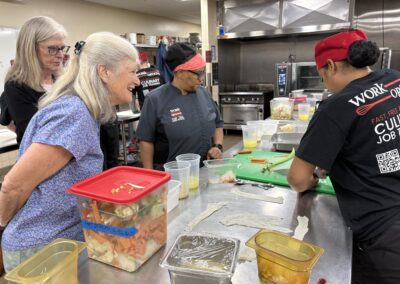Impact100 grantee “Work Options” thrives on change
By Christine Clayton, Impact100 Metro Denver member
June 2025
Work Options, formerly Work Options for Women, was Impact100’s second $100,000 grantee. Margaret Prentice, Impact100 Denver Metro Membership Chair, and I visited Work Options in June for an update on the organization after eight years. We were delighted to find that Work Options was going strong. It survived the pandemic, a disaster for the food business in general. Work Option’s staff learned much from the pandemic, altering the organization’s course and adapting to a new Work Options world. In spite of much change over the years, Work Option’s core mission has remained fundamentally the same: “to help people overcome barriers to sustainable employment by building confidence while providing resources and culinary job training.”
Margaret and I were treated to a grand tour of Work Options, whose operations are now consolidated at the multi-use MOSAIC campus where Johnson & Wales and its training kitchens once were located. Our guide was the dynamic and multi-talented Julie Stone, newly appointed as Executive Director in 2017 around the time that Impact100 made its grant.
First, some history. Work Options was founded in 1997 to assist women in Denver being removed from the welfare assistance rolls. Legislation initiated by the Clinton administration had revamped dramatically the welfare system in the United States requiring, among other things, that after receiving welfare payments for two years, welfare recipients must become employed in order to continue to receive assistance. In Denver there was, and still is, a huge shortage of cooks. So Work Options sought to provide culinary training to people who needed employment and offer them support services as well. Many of Work Options students had never held a job, had criminal records, or had been incarcerated.
Work Options’ initial business model was a successful one. Training was provided in public spaces where federal and state agencies were housed, and the food produced by the trainees was sold for breakfast and lunch to the employees in those spaces. Impact100’s transformational grant, for which Julie is eternally grateful, expanded the scope of that model. Seeing that many of their students had travel restrictions and lived in halfway housing, Work Options used our grant to purchase a mobile training vehicle that traveled to the students.
Enter the Pandemic. Denver had to shut down its public spaces in early 2020. And Work Options for Women began to appreciate the vast extent of food insecurity across greater Denver, some of which pre-dated COVID. What to do? Train elsewhere and provide the food produced, free of charge, to those residents who most needed it! Revenue from the Emergency Meals section of the government became the life saver for Work Options during the pandemic. This model continues today. Visit the Mosaic campus and see how Work Options is supplementing its revenue with a catering business and a Helping Hen food truck and cafe, all derived from the output of the trainee programs.
Work Options offers two training programs free of charge to its students. First is a 4-6 week core culinary skills program. Upon successful completion, students may enroll in the apprenticeship program, during which they may earn nationally recognized certifications—Line Cook and/or Kitchen Manager. And yes, men are eligible for the Work Options programs. During both culinary training programs and for at least one year after completion, Work Options offers its students help and advice with “soft skills”— general job skills, finding employment opportunities, life skills, community-based therapy, and childcare solutions. In fact, Work Options never closes its doors to former trainees who need help and guidance.
Impact. Julie likes to talk about Work Options’ impact and is justifiably proud of its record. The statistics contained in Work Options’ 2024 Annual Report tell the story best.
249 students spent 23,952 hours learning and practicing culinary techniques taught by
professional chefs on Work Options staff.
They spent 5,968 hours in group classes focused on Food Safety and Sanitation, Kitchen Math, Job Readiness, Financial Health, and Cognitive Behavioral Therapy.
Students spent 2,984 hours in the Case Management program. While each student is ultimately responsible for obtaining employment after completion/graduation, each one is supported with help in job searches and approaches to overcoming employment barriers.
Who are the members of the 2024 Work Options student body?
73% had been negatively impacted by the justice system, with 36% having at least one
felony conviction.
One in three had experienced domestic violence.
48% were unhoused.
25% had not graduated from high school.
This diverse population included:
29% Black/African American,
24% White,
21% Hispanic/LatinX,
19% Multiracial,
4% AA/P and
3% Indigenous/native.
And now for the really good part. In 2024:
249 students were enrolled (13% over goal).
224 completed the program.
Average wage upon employment was $19.32 per hour.
Over the last 10 years, wages for Work Options students have more than doubled.
Let us mention, too, the outside recognition that Work Options received last year:
2024 Restaurant Ready Role Model Award from the National Restaurant Association Educational Foundation
2024 Mentor of the Year Award from the Colorado Department of Labor & Employment: Senior Executive Chef Instructor, Joe Beggs
Designation as Quality Apprenticeship Intermediary by the Office of the Future of Work
and Apprenticeship Colorado
To complement these impressive statistics, and equally important, is the impact Work Options is having on the lives of individual members of the greater Denver community, trainees and staff. This is what Julie Stone told us when asked.
“We have daily contact with individuals living in the Micro Communities — a City of Denver program, providing transitional housing for folks moving from homelessness into more traditional housing. We deliver three delicious nutritious meals every day to two different communities for a total of 100 people daily. In January we had our first three individuals from the Micro Communities join our program. They all completed the program and became employed, and I will focus on Troy specifically.
Troy was released from incarceration after serving a 4-year sentence. He was unhoused upon release and did not know how to move forward. He was able to apply for transitional housing and was able to gain housing in one Denver’s Micro Communities where our delivery driver Tom met him when delivering meals. Tom encouraged Troy to give our program a try as the program had given him not only training but a job as well.
Troy followed Tom’s advice and started our Culinary Job Training program. He had perfect attendance and was engaged throughout his 7 weeks of training and job search. He not only completed the program but he found a great job: cooking for the Denver Broncos at their training facility. He joined 10 other graduates in a recent Focus Group and provided insightful suggestions for program development.
One aspect of the program Troy brought to light was the personal value he found in making meals for community members who were food insecure. He told us that being able to make meals to help people was extremely satisfying and helped him feel like a valued community member. He had not expected to feel that way coming out of incarceration. Today, Troy is loving his job and is looking forward to moving into his own apartment.”
Work Options has had some serious challenges over the years, several of which might have caused a less determined, less focused and less resilient organization to shut down. Julie thanks her incredible staff, students, Board members, and supporters like Impact 100Metro Denver to whom Work Options owes its continued success. When we reached out to Julie to request this opportunity to visit the new facility, she replied with these words:
“You all have a special place in my heart as Impact100 Denver Metro gave me my first big opportunity as a new Executive Director. We have evolved through the turbulence of the past six years into a leaner, more effective organization that provides hundreds of thousands of meals to families and seniors in need in our community. We utilize the production of those meals to provide comprehensive culinary job training to people who have challenges but also a desire to work and contribute. I am excited to show you around our new facility and to chat about our new programs and goals.”
Final words from Margaret and me to our fellow Impact100 members: you surely picked a winner!

